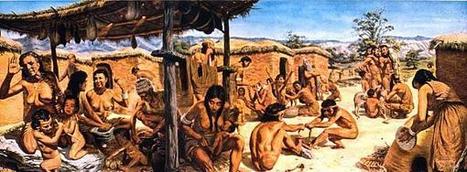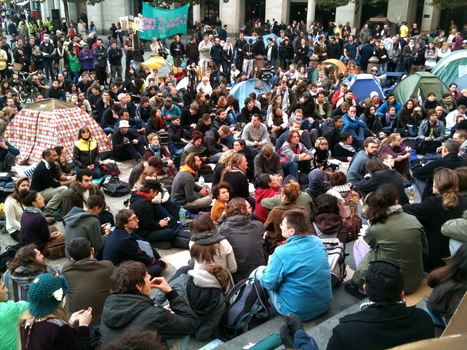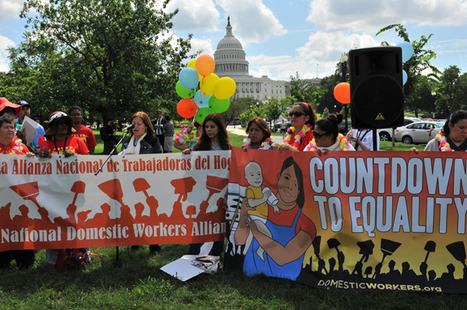 Your new post is loading...
Michel Bauwens (Madison, Wisconsin), June 12, 2016: Part One – Analyzing the global situation One of the best books I have read in the last ten years is undoubtedly, The Structure of World History, by Kojin Karatini.
Marshall Ganz is a ‘social movement scholar’ and author of the book, Why David Sometimes Wins.He shares his general thoughts on the use of social media in the Arab spring.
A post dedicated to setting down in black and white the great conceptual frameworks within which we understand the world.
The crushing of political choice is not a side-effect of this utopian belief system but a necessary component. Neoliberalism is inherently incompatible with democracy, as people will always rebel against the austerity and fiscal tyranny it prescribes. Something has to give, and it must be the people. This is the true road to serfdom: disinventing …
Excerpted from John Harris: “A small-scale revolution that has turned local politics there, and elsewhere, on its head. The basic aim seems both simple and benign: “Taking political power at a local level, then using it to enable people to have a greater say in the decisions that affect their lives.” But the results have …
The emerging global alliance and cooperation between civil, social, and political actors – that is collectively referred to as ‘global civil society’ – is first and foremost a crucial vehicle for transnational civil solidarity, which translates into the consolidation of the hold of civil societies transnationally.In a very limited sense, it is true that this coming on to the world stage of non-state actors contributes to the democratisation of world politics, a stage that has so far been monopolised by nation-states. But seen through the lens of the historic larger and wider democratisation that is beginning to unfold in our times, this cooperation and consolidation is, more importantly – due to the dynamics of civility and its internal tendencies to corporatisation that I have tried to discuss in this essay –, an instrument for the consolidation, strengthening, and imposition of historically unequal social and political relations and entrenched interests at local, national, regional, and global levels. In fundamental terms, what is fondly called ‘global civil society’ is therefore today arguably contributing to less democracy, not more.
In shifting the focus of regulation from reining in institutional and corporate malfeasance to perpetual electronic guidance of individuals, algorithmic regulation offers us a good-old technocratic utopia of politics without politics. Disagreement and conflict, under this model, are seen as unfortunate byproducts of the analog era – to be solved through data collection – and not as inevitable results of economic or ideological conflicts.
Mérida, 29th May 2014 (Venezuelanalysis.com) – The Venezuelan government and commune movement are taking steps to move towards the creation of what is referred to as a “communal state”, which involves community organisations assuming collective control of local production and decision making.
In the beginning was the Horizontal, and it was everywhere, but it was local. Then came the Vertical, and it was stronger, and became global, eventually tempered by the Diagonal. But one day, the Horizontal learned to interconnect, and it too became global, outshining the Vertical. As it became the strongest, it became tempered by the Diagonal, and learned to master the Vertical.
Recent waves of revolutionary struggle – the Occupy movement in New York and elsewhere, London on the steps of St. Pauls, Cairo at the time of Mubarak’s fall, Greece and Spain in response to neoliberalism-imposed austerity, Gezi Park in Istanbul…the list is endless – throw into relief a common issue. The issue is that ofrecognition. Occupy-style events and initiatives point towards a future where mutual recognition serves as a guiding thread in human interaction. The present short paper explains the sense in which this is the case.
Of about 30 detailed indicators I developed for tracing these historical cycles (reflecting popular well-being, inequality, social cooperation and its inverse, polarization and conflict), almost all have been moving in the wrong direction in the last three decades.
“As Falvinge explains, decentralized does not mean leaderless. The leader of or a swarm leads by inspiration and example, setting the vision and goals for the organization while building a culture that empowers members of the swarm to act. Falvinge contrasts this approach with the leaderless structure of the Occupy movement, which he says sacrificed direction and cohesion in favor of the resilience gained by lacking a leader who can be targeted by opposition.
California has been the source of much innovation, from agribusiness and oil to fashion and the digital world. Historically much richer than the rest of the country, it was also the birthplace, along with Levittown, of the mass-produced suburb, freeways, much of our modern entrepreneurial culture, and of course mass entertainment. For most of a century, for both better and worse, California has defined progress, not only for America but for the world.
|
An excellent documentary, with english subtitles, coming from Sweden: “This is a solid, thought provoking documentary covering a relevant economic topic in-depth. The question of capitalism’s grip on the modern world is highly relevant today and the film questions if we should be pushing for a democratic cooperative way of doing business, showing case studies... Continue reading →
In-depth conversation about the role of love in the engaged life, a conversation with David Kim for the Manhattan Neighborhood Network. Watch the video here:
By focusing on hierarchy instead of class, Bookchin became the first Leftist thinker to offer a coherent, meaningful framework for the liberation struggles in the Middle East. His narrative implies that a revolutionary movement in Kurdistan is a struggle at the material origin of institutional hierarchy itself. Although such a localized struggle cannot automatically release hierarchy’s tight grip over rest of the world, it does powerfully illustrate the full scope of the revolutionary task at hand. In this way, the Kurdish freedom movement is not only influenced by social ecology, it also enriches that perspective and articulates it further. The human beings who live at the material origins of institutional hierarchy, and who have maintained organic ways of life there for millennia, are now answering the call to establish the positive conditions of a free society.
The lecture by David Graeber for a audience of occupying students in Amsterdam is a bit chaotic at first but is very much worth your time listening to. Watch the video here:
"‘Against Power Inequalities’ provides a historical guide to the contest for power redistribution through the centuries, and draws out the underlying obstacles to the development of more inclusive communities."
“The Venezuelan government and commune movement are taking steps to move towards the creation of what is referred to as a “communal state”, which involves community organisations assuming collective control of local production and decision making.
“The old icebergs of state and corporation are dissolving into a fluid sea where action only becomes meaningful in concert with others. The waves of change demand interconnections, because we know all of us together are smarter than any one of us on our own.
In the struggle for social justice it’s not how much empathy we feel that makes the difference, but what we do with it in concrete situations. This is the third in our series of articles about empathy and transformation.
“The US political system has been under the influence of wealthy elites ever since the American Revolution. In some historical periods it worked primarily for the benefit of the wealthy. In others, it pursued policies that benefited the society as a whole. Take the minimum wage, which grew during the Great Compression era and declined (in real terms) after 1980. The proportion of American workers who were unionised changed in a similarly cyclical fashion, as the legislative field tilted first one way then the other. The top marginal tax rate was 68 per cent or higher before 1980; by 1988 it declined to 28 per cent. In one era, government policy systematically favoured the majority, while in another it favoured the narrow interests of the wealthy elites. This inconsistency calls for explanation.
“What may really persuade people to come together is common experience as the experience of commonness. It is undertakings rather than abstract theory. In today’s world, it is not the argument or emotion that can form social bonds, but common actions that build real and long-term trust. Sociologists express concern about the decrease of social capital, what Robert Putnam calls the phenomenon of “bowling alone.” Less is written about how one can act politically in such a “post-society.” It appears that “social glue” cannot be produced on a mass scale. “Together,” in real life, refers to a very few, later to a few dozen, at most to a few hundred people, if it is to be a real together, one that derives from common experiences. But the power of close-knit people is enormous, and their determination is far greater than that which emerges from the logic of the market or NGOs, much less the glitzy but desiccated party structures.
|
 Your new post is loading...
Your new post is loading...




















